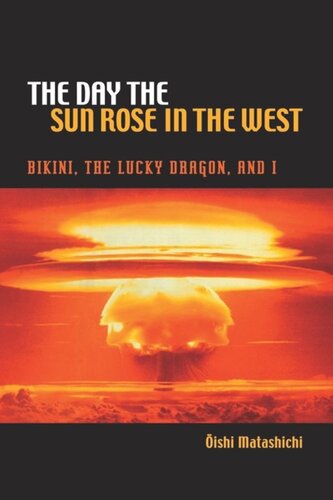

Most ebook files are in PDF format, so you can easily read them using various software such as Foxit Reader or directly on the Google Chrome browser.
Some ebook files are released by publishers in other formats such as .awz, .mobi, .epub, .fb2, etc. You may need to install specific software to read these formats on mobile/PC, such as Calibre.
Please read the tutorial at this link: https://ebookbell.com/faq
We offer FREE conversion to the popular formats you request; however, this may take some time. Therefore, right after payment, please email us, and we will try to provide the service as quickly as possible.
For some exceptional file formats or broken links (if any), please refrain from opening any disputes. Instead, email us first, and we will try to assist within a maximum of 6 hours.
EbookBell Team

4.1
60 reviewsOn March 1, 1954, the U.S. exploded a hydrogen bomb at Bikini in the South Pacific. The fifteen-megaton bomb was a thousand times more powerful than the atomic bomb that destroyed Hiroshima, and its fallout spread far beyond the official “no-sail” zone the U.S. had designated. Fishing just outside the zone at the time of the blast, the Lucky Dragon #5 was showered with radioactive ash. Making the difficult voyage back to their home port of Yaizu, twenty-year-old Oishi Matashichi and his shipmates became ill from maladies they could not comprehend. They were all hospitalized with radiation sickness, and one man died within a few months. The Lucky Dragon #5 became the focus of a major international incident, but many years passed before the truth behind U.S. nuclear testing in the Pacific emerged. Late in his life, overcoming social and political pressures to remain silent, Oishi began to speak about his experience and what he had since learned about Bikini. His primary audience was schoolchildren; his primary forum, the museum in Tokyo built around the salvaged hull of the Lucky Dragon #5. Oishi’s advocacy has helped keep the Lucky Dragon #5 incident in Japan’s national consciousness.
Oishi relates the horrors he and the others underwent following Bikini: the months in hospital; the death of their crew mate; the accusations by the U.S. and even some Japanese that the Lucky Dragon #5 had been spying for the Soviets; the long campaign to win government funding for medical treatment; the enduring stigma of exposure to radiation. The Day the Sun Rose in the West stands as a powerful statement about the Cold War and the U.S.–Japan relationship as it impacted the lives of a handful of fishermen and ultimately all of us who live in the post-nuclear age.